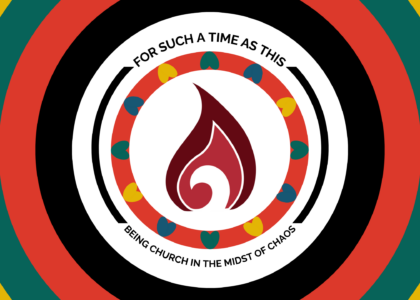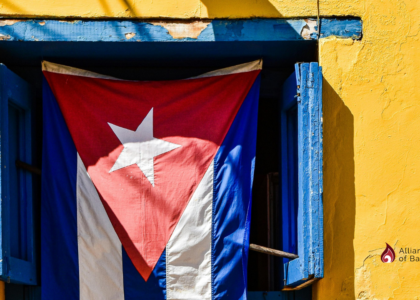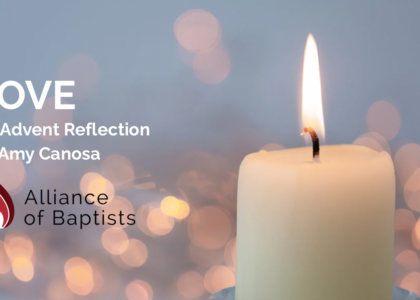by Alexis Tardy
“Now there stood by the cross of Jesus his mother, and his mother’s sister, Mary the wife of Cleophas, and Mary Magdalene.25
When Jesus therefore saw his mother, and the disciple standing by, whom he loved, he saith unto his mother, Woman, behold thy son!26
Then saith he to the disciple, Behold thy mother! And from that hour that disciple took her unto his own home.”27 – John 19:25-27
“Solidarity can never be severed from [the] self-giving love [of Christ]. Only those who follow the example of the Crucified and struggle on the side of the exploited, despised, and poor ‘will discover him at their side’.“ —M. Shawn Copeland, Enfleshing Freedom: Body, Race, and Being
“The great revelation is that, if our struggle is authentic, we find we are not alone…The struggle is in fact a blessing, a blessing that arises in a new being and a new capacity for experience.”—James Finley, Merton’s Palace of Nowhere
Solidarity with those who are oppressed, exploited, despised and impoverished by the powers that be will bring you into a new family and a converted soteriology. In her writings on creation care and eco-justice, womanist theologian Karen Baker-Fletcher offers, “Salvation in this life is found in communities of solidarity and resistance.” Like an invisible fire that materializes, the public execution of Michael Brown, Jr. on August 9th, 2014, sparked the Ferguson uprising and rebellion that shifted the landscape of America and reverberated throughout the world. How could it not? An 18-year-old who just graduated from high school, walking in his own neighborhood and apartment complex with his friend Dorian Johnson, suddenly riddled by 12 bullets fired by police officer Darren Wilson.
There was an altercation between Michael, Jr. and officer Wilson before officer Wilson shot Michael, Jr. several times that some have used to justify an unjust murder. As if that were not enough, Michael Jr.’s mother, Lezley McSpadden, father, Michael Brown, Sr., and the community had to behold their son’s bleeding body that lay in the street only a few feet away, uncovered, for several hours in the burning August sun. The undignified cruelty of police, medical officials, and other authorities in not covering Michael Jr.’s body as he lay there for hours cannot be overstated. It is a social sin and soul malformation we have never recovered from.
They stood at the foot of the cross of the Crucified one. His mother, disciples, community, even his enemies, watched as Jesus was publicly executed. It seemed as though the dawning of a new movement was being killed in its infancy. Even as he was bloodied, uncovered, dying on the cross, Jesus embodied what he always did in ministry—prepared his followers for action while discouraging spectatorship. “Woman, behold thy son!” “Behold thy mother!” Though Jesus came to bring familial division (Luke 12:53) and disrupted family businesses (Matthew 4:21-22), perhaps it was because he was cultivating a new understanding of kinship and way of living that was based on, in the words of Andrew Wilkes, a “solidarity economy” that has “plenty good room for all.” Mary now had another son; the disciple, a new mother. In Acts 2, after they have witnessed a resurrected Jesus, the disciples led a solidarity economy where rich and poor, young and old, people of various ethnicities, identities, and tongues, gave everything they had so everyone could have what they needed.
Evil should not sit comfortably, and the den of robbers must be driven out, no matter where they are. The gospel, the Good News, is on-the-ground love as justice that is felt and known through actionable solidarity. There is nothing else.
The movement was not ending—it could not even truly begin until followers and enemies of Jesus alike could witness that death could be defeated. That death is the worst empire can do. The pneumatological dimension of a revolution is not just speaking in tongues—it is a holy, loving boldness that is willing to go into the belly of the beast of empire, to not look away from the injustices and oppression that empire deploys even if we sometimes need to take a breath, and to struggle and fight for truth even if that means we always have to factor in that death is possible. From Ferguson to Atlanta to Palestine, we have lost the fiber of our humanity if our hearts are not broken by murder, cop cities, and devasting genocide. Even when it is alluring, we cannot only be worshippers of Christ; we must be followers of Jesus.
The reality of Michael Brown Jr.’s murder is that Ferguson and the surrounding communities had already been under the weight of the American empire that expressed itself through the tyranny of an unjust municipal government and a Ferguson Police Department (FPD) that focused more on generating revenue for white residents than keeping the community safe. FPD targeting Black folks didn’t begin with Michael Brown, Jr.; it was a day-to-day occupation that the community had lived under for years. The response of the Ferguson Uprising to this occupation was unfettered, unbought rage. This follows the experience of Black Rage, as explained by authors Too Black and Rasul Mowatt—“Because Rage directs us to the lead in the water, the shot child, the infant biting rats in the apartment complex, the closed public school for the sake of a charter school, the ever-increasingly high rent, the demolished hospital in the organized abandoned neighborhood.” The Rage of Ferguson residents and activists led us into a resistance we should not only memorialize but glean and act from today.
Jesus resisted while he and his community were under occupation; Palestinians have and continue to resist Israeli occupation; the Ferguson uprising resisted the local expressions of occupation through over-policing and resource deficits as well as the American expression of occupation through military-grade humvees and chemical weapons (i.e., teargas) on neighborhood streets. Michael Brown, Jr.’s blood still protests from the ground in a life cut down.
I hope that as people of faith and followers of Jesus we have the courage to be and to stay both heartbroken and enraged. I pray we move from being spectators to actually following Jesus’ command to become disciples. The material conditions around us should not remain the same—a world that engenders children who cannot eat, a call for help to police to stop a suspected prowler that leads to point-blank murder on your own porch, prisons as the last mental health institutions, entire bloodlines—from the grandparents to the youngest infant—gone in Gaza. Evil should not sit comfortably, and the den of robbers must be driven out, no matter where they are. The gospel, the Good News, is on-the-ground love as justice that is felt and known through actionable solidarity. There is nothing else.

Alexis Tardy is a Minister and member of the National Benevolent Association Peer Learning and Wellness Group, La Lucha (The Struggle). Before returning to Indianapolis, Indiana in 2020, Alexis was the Program Director at Faith and For the Sake of All, where she organized trainings and workshops to end racial disparities in Saint Louis, Missouri. As a consultant for Urban Strategies, she’s also mentored youth and worked with families and community leaders in Ferguson, Missouri. She is currently a consultant for the Alliance of Baptists as coordinator of the THRIVE project. Alexis earned a Bachelor of Science degree in Public Affairs at Indiana University-Purdue University Indianapolis, a Master of Divinity degree from Eden Theological Seminary in Saint Louis, and a Doctor of Ministry in Womanist Preaching degree from Memphis Theological Seminary.




Recent Comments